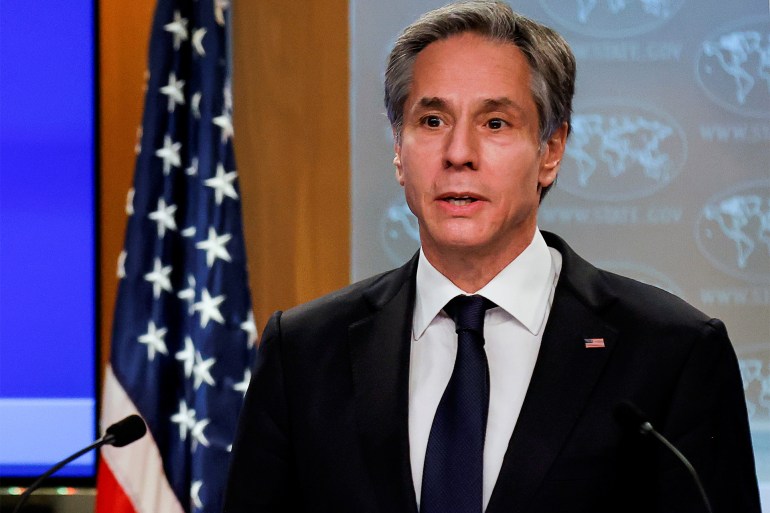Washington
- US Secretary of State Anthony Blinken confirmed that his country had delivered its official response to Russia's demands regarding the Ukraine crisis, through its embassy in Moscow.
The US minister indicated, in a press briefing, that his country will not disclose the content of its response to the Russian proposals, because it considers that confidentiality is better at the diplomatic level.
Blinken told reporters that the United States sent Russia its response to the security proposals, and expressed its concerns regarding any "Russian aggressive action," noting that the response included "very positive things."
The minister added that the aforementioned response was carried out in coordination with Ukraine and European allies, and NATO will also deliver its own response to Moscow later today.
Russian proposals
Russia had submitted its proposals on security and security guarantees in Europe to Washington on December 17, and demanded a written response to its proposals.
The Russian proposals included two agreements with Washington and NATO on the file of security guarantees, which has become at the heart of a series of talks held by the two sides in recent weeks.
These proposals, according to Russian reports, include the main points:
First: guarantees that NATO will not expand to the east on the territory of Ukraine and any other countries.
Second: Documenting commitments not to deploy new American medium and short-range missiles in Europe, because the installation of such weapons could lead to a radical deterioration of the security situation on the European continent.
Third: Reducing military activities in Europe, and excluding the increase of the so-called forward stationed forces groups.
The United States and Western countries accuse Russia of preparing a military attack on Ukraine, which Moscow denies on several occasions, considering the accusations as a pretext to increase NATO's military presence near its borders.
Moscow also denies what the West is circulating about its intention to launch an attack on Ukraine, stressing that all reports about that are false and are intended to escalate tension in the region and inflame anti-Russian rhetoric.
Moscow considers that Western statements about the alleged "Russian aggression" come as a preparation for imposing new economic sanctions, and as a justification for NATO's expansion to the east, which it considers a threat to national security.
The essence of the American response
Washington adheres to the possibility of reaching compromises with Russia on European security issues, without the need to commit not to include new members.
Blinken said he hoped Russia would "take our response seriously and expect to meet with the Russian foreign minister as soon as he finishes reading our response. We are open to dialogue and diplomacy, and are ready for mutual transparent procedures regarding the stationing of our forces."
Commentators pointed out that the US response includes affirming the dual position, on the one hand threatening to impose unprecedented sanctions on Russia that may affect President Vladimir Putin himself, and on the other hand it supports the diplomatic path to avoid any Russian invasion of Ukraine.
Blinken stressed that the US response gives Russia a choice between diplomacy and escalation over the Ukraine crisis (Reuters)
Washington also asserts that if Russia invades Ukraine, it will incur a great cost, especially with the United States and Western allies sending a lot of weapons and equipment to Ukraine in recent days and weeks.
The Pentagon announced yesterday that it had raised its readiness to deploy thousands of soldiers in eastern Europe, following the latest developments.
Pentagon spokesman John Kirby said in a press conference that Defense Secretary Lloyd Austin had ordered an increase in the readiness and readiness of military units of about 8,500 soldiers inside the United States to be ready in a short period of time to deploy in Europe, if the rapid deterrence force is activated. of NATO.
Extremism reigns supreme
Numerous rounds of diplomatic negotiations between the United States and NATO on the one hand, and Russia on the other hand, failed to reach any compromises through which to work.
These diplomatic efforts included a virtual meeting between the Russian presidents and his American counterpart Joe Biden last month, in addition to several meetings in European cities at the level of foreign ministers and their deputies.
Washington adheres to the policy of "open doors to NATO", which does not prevent Ukraine from joining the alliance in the future, at a time when the United States officially confirms that there are no plans to include Ukraine in NATO in the near future.
Biden had ruled out the possibility of Ukraine joining NATO during his press conference last week. On the contrary, Putin stresses the need to receive guarantees that include not joining NATO in the future.

